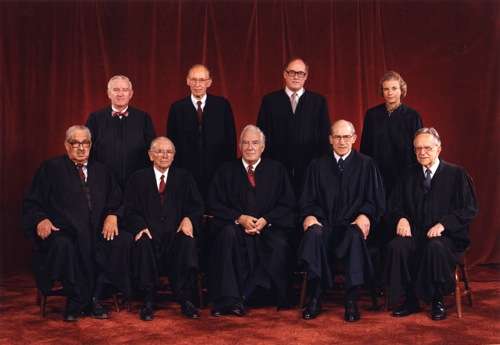The Volokh Conspiracy
Mostly law professors | Sometimes contrarian | Often libertarian | Always independent
Today in Supreme Court History: November 30, 1981
11/30/1981: Harlow v. Fitzgerald argued.

Editor's Note: We invite comments and request that they be civil and on-topic. We do not moderate or assume any responsibility for comments, which are owned by the readers who post them. Comments do not represent the views of Reason.com or Reason Foundation. We reserve the right to delete any comment for any reason at any time. Comments may only be edited within 5 minutes of posting. Report abuses.
Please to post comments


From Oyez...
"On November 13, 1968, A. Ernest Fitzgerald, a management analyst in the Department of the Air Force, testified before the Subcommittee on Economy in Government of the Joint Economic Committee of the U. S. Congress regarding $2 billion in unexpected costs associated with the C5-A transport plane along with its technical difficulties. In January 1970, he was fired, and he believed his dismissal was in retaliation for his testimony. Fitzgerald sued presidential aides Bryce Harlow and Alexander Butterfield for civil damages and claimed they were involved in a conspiracy that resulted in his wrongful dismissal. Both Harlow and Butterfield claimed to have no knowledge of any conspiracy and asserted that their actions surrounding this issue were undertaken in good faith. Harlow and Butterfield moved for summary judgment, which the court denied. The district court also found them ineligible for immunity. They appealed the denial of immunity to the Court of Appeals for the District of Columbia Circuit, and the Court of Appeals dismissed the appeal without issuing an opinion."
8 - 1 Qualified Immunity for the officials.
Seems quite ambitious - and misguided - on Fitzgerald's part to go after presidential aides.
Why not go after presidential aides? Should they not be held to account?
Immunizing government actors was not one of the principles animating the Colonies' violent secession from the British empire.
I've never understood why qualified immunity has become such a big, shiny object. First, Congress can get rid of it anytime it wants. QI isn't a constitutional doctrine, it is a judicial gloss on a statute, incorporating and modifying -- whether correctly or not is not the point -- existing types of immunities for government officials. Given that Congress hasn't seen fit to do that in decades, the Supreme Court is not likely to abolish it, though some of its recent doctrinal developments, which make no sense to me, could be rolled back judicially. Second, in my three decades of representing state government officials, QI has had a meaningful role in very few of my cases -- and all of those would likely have come out the same way without it. Considerable academic research -- Joanna Schwartz's is particularly good -- is consistent with my experience. I suspect most of the QI critics, if they got their way, would be like the dog that caught the car. Now what? We'd get a bunch of cases now dismissed on QI grounds dismissed on the grounds that "I believe the cops" or "You don't have the rights you think you have," which hardly improves matters for victims of government overreaching.
Why is it a thing, at all?
Congress was not given the power to create immunity for any government actors. Absent direct, unequivocal power to do so, the question is not open for discussion.
Likewise, the judiciary was not given the power to create immunity for fellow employees of the King.
https://www.theonion.com/area-man-passionate-defender-of-what-he-imagines-consti-1819571149
Nothing like making up your own law. Congress passed the laws that allow federal suits against state officials. It didn't have to do that, and if it didn't there's nothing anyone could do about it. And when it did pass those laws, it could create all sorts of limits on the statutory right that it created in the first place. Like what you could sue about, when or where you could sue, or whether the officials had any kind of immunity. The Supreme Court held long ago that when Congress passed those laws it intended certain common-law immunities, as the Court understood them, to apply. That may have been right or wrong, either about what Congress intended or what the common-law immunities were, but if it was wrong, Congress has the power to correct the error and, for decades, has chosen not to execute it.
You allege that there is "[N]othing like making up your own law." Presumably, you were referring to me.
What is the law I am allegedly "making up?"
How about:
Congress was not given the power to create immunity for any government actors. Absent direct, unequivocal power to do so, the question is not open for discussion.
Likewise, the judiciary was not given the power to create immunity for fellow employees of the King.?
It makes a difference in a few circuits where it is applied in a really strict fashion.
So courts will say things like "that case doesn't clearly establish the law, because in that case, they tasered the suspect after he was on the ground and here they tasered you when your hands were up in the air".
And then those decisions are hard to get reversed en banc or at SCOTUS.
Plus, there's just the cost of it. Defendants are allowed interlocutory appeals of QI decisions, which slow up cases and make them more expensive to prosecute.
Without QI, there are going to definitely be more victories for plaintiffs, at least in certain circuits.